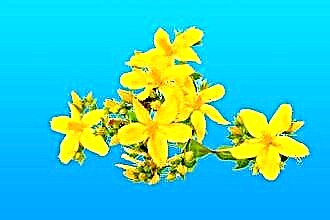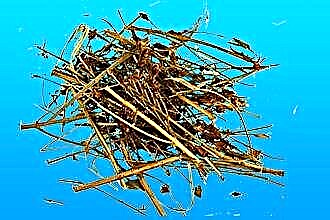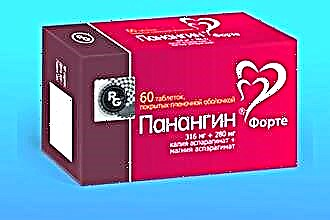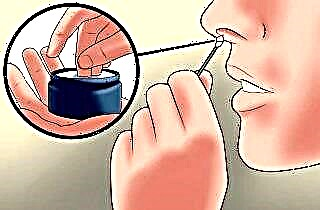St. John's wort is a well-known and widely used herb in folk medicine. He is credited with medicinal properties: diuretic, astringent, anti-inflammatory, immunostimulating, analgesic, antibacterial effects. St. John's wort also affects blood pressure, namely increases it and can be used for hypotension. People with high numbers or periodic surges should avoid long-term use of funds based on this plant.
Treatment of hypotension with St. John's wort: does it make sense?
St. John's wort contains a huge amount of unique nutrients, which give it healing qualities. The presence of the following components has been established:
 flavonoids - glycosides with antioxidant and rejuvenating effects, prevent aging, regulate the permeability of vascular walls, increase their elasticity and prevent sclerotic lesions;
flavonoids - glycosides with antioxidant and rejuvenating effects, prevent aging, regulate the permeability of vascular walls, increase their elasticity and prevent sclerotic lesions;- organic acids - have a positive effect on the nervous and cardiovascular system, prevent the degeneration of healthy cells into atypical (malignant) ones;
- tocopherol (vitamin E) is necessary to maintain the normal condition of the skin and cleanses the body of free radicals;
- saponins enhance the secretory function of the glands and have an anti-cholesterol effect;
- rutin strengthens the walls of blood vessels and increases their elasticity;
- hyperforin and hypericin improve the functioning of the central nervous system, eliminate depressive conditions.
St. John's wort - has a neutral effect on blood pressure, but hypertensive patients need to be careful with long-term treatment, as surges or even a hypertensive crisis may appear. Hypotonics, on the contrary, have the opportunity to use the plant to improve their well-being and as a tonic.
The mechanism of action of St. John's wort extract on blood pressure
St. John's wort contains a large amount of astringent substances that increase blood density, increase blood pressure and can be dangerous for those suffering from hypertension. Useful components have a positive effect on blood vessels - they strengthen them, cleanse and prevent the accumulation of cholesterol plaques, thereby preventing stroke and heart attack. It also has a beneficial effect on the nervous system - it tones it up, improves metabolic processes, eliminating pressure surges in vegetative-vascular dystonia (VVD).
Considering all the beneficial properties, St. John's wort can be indicated for hypotension, as it improves the functioning of the cardiovascular system and normalizes nervous regulation. With the right dose, it raises blood pressure to optimal levels.
How to properly prepare St. John's wort medicine: homemade recipes
In folk medicine, the following types of plants are used: St. John's wort and tetrahedral. These are herbs 30-70 cm tall with yellow flowers. Habitat - dry meadows and forest glades. Flowers, leaves and stems of the plant have a healing effect.
Collection and procurement rules
 For collecting grass, they choose places away from highways, landfills and industrial enterprises so that the plant contains as little harmful substances as possible. It is better to harvest St. John's wort from mid-June to August, during active flowering.
For collecting grass, they choose places away from highways, landfills and industrial enterprises so that the plant contains as little harmful substances as possible. It is better to harvest St. John's wort from mid-June to August, during active flowering.
You need to dry the workpieces in a natural way without using heat treatment. Drying time is on average 14-20 days. There are several drying options:
- Gather in bunches, tie and hang with inflorescences down in dark, well-ventilated rooms, since sunlight destroys healing substances.
- Spread the herb in one layer on parchment paper, turn over from time to time.
- Fold into mesh bags in small portions, hang and dry in a dark place.
- You can also use drying devices at temperatures no higher than 30 degrees.
Preparation of different dosage forms
Medicines from St. John's wort are prepared in a different way:
- Infusion. Take 2 tablespoons of fresh or 1 tablespoon of dried St. John's wort, pour a glass of boiling water. Leave for 2 hours under the lid, drain.
- The broth differs from the infusion in the way of preparation and in a higher concentration. You can use both fresh and dry raw materials. 1 tablespoon of chopped herbs, pour 200 ml of water and boil for 20 minutes in a water bath. Insist 30 minutes, drain.
- Hypericum tea. Brew like a familiar drink. You can add linden, currant twigs, rose hips, raspberries, put honey or lemon for taste.
- Tincture. Prepare in a ceramic or glass dish. Pour 1 part of dry raw materials with 5 parts of vodka or alcohol, stand for 10 days, shaking the container daily. Drain the medicine after the infusion period has expired.
- Concentrated tincture. Fill the jar tightly with the flowers and leaves of the plant, fill with vodka and close hermetically. Insist for 14 days in full sun until a deep red color is obtained. Then strain and pour into a dark glass bottle.
 St. John's wort oil. Grind 25 grams of fresh herbs and pour 200 ml of olive or sunflower oil, leave for 3 weeks, filter.
St. John's wort oil. Grind 25 grams of fresh herbs and pour 200 ml of olive or sunflower oil, leave for 3 weeks, filter.
Storage of funds
You can store dried St. John's wort in paper or cotton bags, either whole or in a crushed form, in a dark and not damp place. Shelf life is no more than 2 years.
The shelf life of ready-made medicines depends on the preparation method. St. John's wort tea should be drunk immediately, the broth - during the day, because with prolonged infusion, toxic substances begin to be released. When making tinctures, this must also be remembered - after the expiration of the prescribed days for aging, it is imperative to filter the mixture so that no plant particles remain that can poison the medicine.
Tinctures and oils can be stored for several months, as their solvents are natural preservatives. However, it is better not to prepare medicines in large volumes. Everything that is done at home should be stored in dark glass containers, in a cool place, protected from direct sunlight and out of the reach of children.
How to properly use the medicine with St. John's wort with hypotension?
Headaches, dizziness, nausea, and the flickering of flies before the eyes can be signs of hypotension. But do not rush to self-medicate. It is necessary to consult a doctor, undergo examinations, because taking folk remedies from St. John's wort has a number of contraindications: allergic reactions to the plant, hypertension, hepatomegaly (enlarged liver), impaired potency, constipation, loss of appetite. Also, you can not take these drugs during pregnancy, breastfeeding. The doctor will clarify the need for taking folk remedies, the dose and duration.
Administration and dosage
 The dose of the drug depends on the preparation method. A decoction of St. John's wort is drunk for half a glass 3 times a day. Tincture for hypotensive patients should be taken 40-50 drops 3 times a day. If it turns out to be concentrated, the dose must be reduced by 2 times. When, for some reason, alcohol-based medications are contraindicated, they can be replaced with infusions: 50 ml 3 times a day. It is important to monitor your blood pressure on a daily basis.
The dose of the drug depends on the preparation method. A decoction of St. John's wort is drunk for half a glass 3 times a day. Tincture for hypotensive patients should be taken 40-50 drops 3 times a day. If it turns out to be concentrated, the dose must be reduced by 2 times. When, for some reason, alcohol-based medications are contraindicated, they can be replaced with infusions: 50 ml 3 times a day. It is important to monitor your blood pressure on a daily basis.
An excellent option for using St. John's wort is to take oil from this plant. It must be drunk 1 teaspoon 2 times a day one hour before meals or 2 hours after. Also, the product can be added to salads or cereals.
Tea can be taken several cups a day, the main rule is to brew fresh every time.If you add a couple of sprigs of mint or lemon balm to the teapot, it will be useful to drink the drink in the evening to improve sleep.
Course duration and frequency of admission
St. John's wort from low blood pressure does not act instantly, but has a cumulative effect. The duration of the course depends on the severity of hypotension and lasts from 2 weeks to a month. If the indicator has returned to normal, you can take a break or switch to a preventive tea intake several times a week.
It is important to control your well-being during treatment. If there are side effects (allergic reactions, headaches, digestive disorders, decreased potency), you must immediately stop taking.
Conclusions
St. John's wort is an incredibly useful potion rich in medicinal substances. But, like any medicine, it has indications and contraindications for use. Before starting the appointment, you need to consult a doctor, especially if there is a concomitant pathology. In addition, St. John's wort increases blood pressure when the dose is exceeded or for prolonged uncontrolled use.

 flavonoids - glycosides with antioxidant and rejuvenating effects, prevent aging, regulate the permeability of vascular walls, increase their elasticity and prevent sclerotic lesions;
flavonoids - glycosides with antioxidant and rejuvenating effects, prevent aging, regulate the permeability of vascular walls, increase their elasticity and prevent sclerotic lesions; St. John's wort oil. Grind 25 grams of fresh herbs and pour 200 ml of olive or sunflower oil, leave for 3 weeks, filter.
St. John's wort oil. Grind 25 grams of fresh herbs and pour 200 ml of olive or sunflower oil, leave for 3 weeks, filter.

